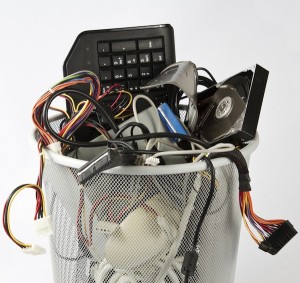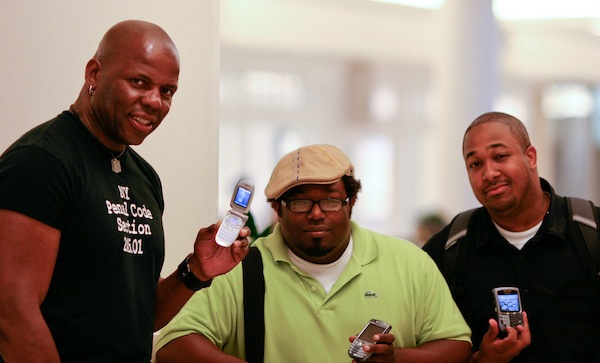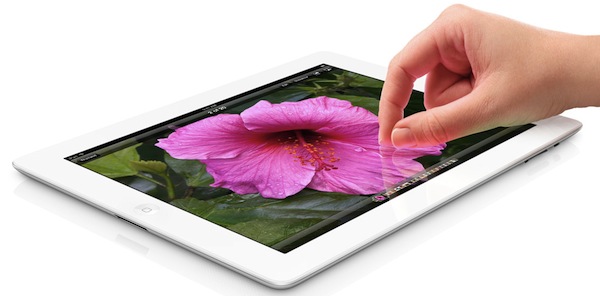Does iPad make the PC obsolete?
 The question is really about the "new iPad" that Apple launched earlier this week. I say "Yes", for many people needing to upgrade their computers. Many of you will answer "No". Who is right?
The question is really about the "new iPad" that Apple launched earlier this week. I say "Yes", for many people needing to upgrade their computers. Many of you will answer "No". Who is right?
The new iPad is a transformative device, extending on the disruption caused by the original model in April 2010 and its successor a year ago. The 2048 x 1536 resolution display is main reason. For many people, the new iPad will offer the best computer screen they can afford, and, if they get a 4G model, one that is always connected. New iPad is the poster child for the cloud connected-device era.
Imagine the creative and consumption possibilities of greater-than-HD display on a connected, whether cellular or WiFi, portable device. The high-res display widely opens up the tablet's utility for education, healthcare and publishing -- and every other vertical where portability and high resolution is a marriage of opportunity.
The new iPad puts tremendous pressure on Microsoft as it preps Windows 8 and Windows on ARM for future tablet sales -- as in holiday 2012 the earliest. Nothing running Android competes, or likely will for at least the next 12 months. Unquestionably, many people needing to upgrade PCs won't. They'll choose new iPad instead.
Chilling PC Sales
Many PC owners already chose one of the first two models, which along with smartphones are chilling PC sales. "The use of applications such as email, social networking and Internet access, that were traditionally the domain of the PC, are now being used across media tablets and smartphones, making these devices in some cases more valued and attractive propositions", Ranjit Atwal, Gartner research director, says.
Yesterday, Gartner offered a bleak forecast for 2012 PC shipments: 4.4 percent year-over-year growth, and that's off a weak comparison since 2011 disappointed -- the worst year in a decade, says IDC.
"PC shipments will remain weak in 2012, as the PC market plays catch up in bringing a new level of innovation that consumers want to see in devices they purchase", Atwal says. Consider this: Gartner's forecast takes into account two sweeping changes coming to the traditional PC market this year: Ultrabooks and Windows 8 -- and still the forecast is tepid.
"The real question is whether Windows 8 and ultrabooks will create the compelling offering that gets the earlier adopter of devices excited about PCs again", Atwal says.
Thirteen months ago today, I declared: "The PC era is over". Being over doesn't mean dead. It's a transition, with the PC's relevance declining before cloud-connected devices. The PC will be with us for years, it just won't be as important as other devices. New iPad will be the star child for at least the next two quarters and capitalizes on changing behavioral trends.
"Consumers will now look at a task that they have to perform, and they will determine which device will allow them to perform such a task in the most effective, fun and convenient way. The device has to meet the user needs not the other way round", Atwal says. Smartphones and tablets are more task-oriented devices than the traditional PC.
Even Microsoft now tacitly acknowledges that the PC era is over. What is Windows 8 or Windows on ARM all about? The Metro UI they share is optimized for touchscreen interfaces for portable devices. Windows on ARM is the future of Microsoft operating systems, and will transcend the traditional PC. Windows 8 is a lifeline to those individuals and businesses that need support for legacy applications, hardware and behavior, while providing a way, through Metro, to what Apple calls the "post-PC era". I call it the cloud-connected device era.
Microsoft will contribute to the decline of the traditional PC, which "will face more competition as we see new media tablets based on operating systems from Android and Microsoft, as well the new iPad", Atwal says. New iPad is here March 16.
Apple's New Crop
For Apple, the transition to the cloud-connected device era has brought breathtaking transformation. During fiscal first quarter 2012, iPhone generated nearly as much revenue as all Apple did in fiscal 2007 ($24.42 billion to $24.58 billion) -- the year the smartphone launched. During the same quarter, Apple revenue topped that for all of fiscal 2009 ($46.33 billion to $42.91 billion).
In June 2007, I stood outside the Apple Store Montgomery Mall in Bethesda, Md., with people waiting to purchase the first iPhone. A buyer named Steve told me: "I think this is a day that you're going to see a change in how computers, how handheld computers are done. It's a little marketing history. I'm seeing it that way...I think we'll look back in 10 or 15 years, and like on that day the gadget came out -- same thing with iPod -- it changed the game".

Chris, Steve and Eddie wait to buy first iPhone, June 2007
I appreciated the sentiment, but didn't really believe it. iPhone buyer Steve was right about the transformation and the looking back to it, just not the time period. iPhone was the top-selling smartphone in 2011, according to Gartner, a feat Apple accomplished in less than four years, entering the market from scratch. Apple followed iPhone with the App Store (in July 2008) and iPad (April 2010). The rest really is history, culminating in 25 billion app downloads over the weekend and 62 million iOS devices sold just in fourth quarter, according to Apple CEO Tim Cook.
Apple sold 172 million iOS devices during calendar 2011. By my math, considering 315 million cumulative sales, Apple sold 54.6 percent of all iOS devices in a single year, which indicates considerable accelerated momentum. Stated differently, according to Cook, iOS devices accounted for 76 percent of Apple revenues last year. The Cupertino, Calif.-based company already has moved to the cloud-connected device era.
Apple's success will quake other markets. Today IHS iSuppli forecast that media tablets would be fourth-largest consumer of semiconductors by 2014 -- that's up from 35th in 2010.
"Driven primarily by Apple’s iPad, the media tablet in four years is expected to scale semiconductor heights that took more than a decade for other products to attain, such as notebook PCs and cellphones", Dale Ford, head of IHS iSuppli electronics and semiconductor research, says. "This meteoric ascension will have major repercussions for the global semiconductor industry, as it realigns to accommodate the fast growth and vast size of the media tablet market".
Based on revenue, that would put media tablets just behind desktop PCs, but far behind laptops.
Intimacy is Why
How is iPad driving such industry change? Intimacy is part of tablets' appeal, something I failed to grok when Apple announced the original iPad in January 2010. Days before, I opined: "The world doesn't need an Apple tablet, or any other". Six months later, after actually using the device, came my mea culpa: "I was wrong about Apple iPad".
I made the change not because of any sales figures (Apple hadn't released any) but experience. I surprisingly found the experience using iPad to be intimate and reading to be immersive. Part of this immersive experience is the technology, but also how iPad is used. Apple's tablet is a sit down and focus device, as much because of size and shape as screen and user interface. The totality -- physical design and software benefits -- is immersion.

As I've repeatedly expressed: The best user interface is you. Human beings are tool users who experience and manipulate the world through five senses. Hands and fingers are important because they are active -- they’re how people tactilely manipulate the world around them. Touch is hugely important, and makes tablets more personal, the experience more intimate. The finger and touch are more natural, because they extend you. Good user interfaces build on the familiar -- and there is nothing more familiar than me, myself and I.
I predict that new iPad's high-resolution display will appeal as much for increasing intimacy and immersion as extending the device's utility to businesses. Many people will, by comparison, see their PCs as old, archaic -- like the cell phone to their landline -- obsolete, unnecessary. People still use landlines -- they haven't gone away. They're just not as relevant, and as relevancy decreases so does usage.
iPad will make the PC obsolete, or lead the way to it. Microsoft is following along with Metro on Windows 8 and Windows on ARM. It's no longer a question of if but when.
Photo Credits: Biehler, Michael/Shutterstock (top); Joe Wilcox (middle); Apple (bottom)
